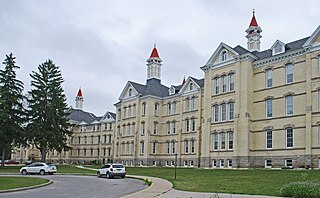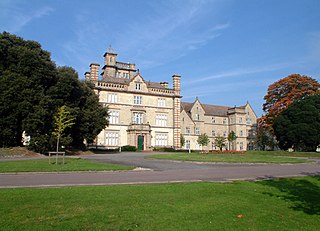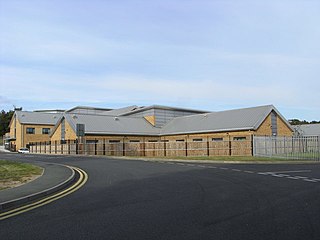Related Research Articles

Psychiatric hospitals, also known as mental health hospitals, behavioral health hospitals, are hospitals or wards specializing in the treatment of severe mental disorders, such as schizophrenia, bipolar disorder, eating disorders, dissociative identity disorder, major depressive disorder and many others. Psychiatric hospitals vary widely in their size and grading. Some hospitals may specialize only in short-term or outpatient therapy for low-risk patients. Others may specialize in the temporary or permanent containment of patients who need routine assistance, treatment, or a specialized and controlled environment due to a psychiatric disorder. Patients often choose voluntary commitment, but those whom psychiatrists believe to pose significant danger to themselves or others may be subject to involuntary commitment and involuntary treatment. Psychiatric hospitals may also be called psychiatric wards/units when they are a subunit of a regular hospital.
Care in the Community is a British policy of deinstitutionalisation, treating and caring for physically and mentally disabled people in their homes rather than in an institution. Institutional care was the target of widespread criticism during the 1960s and 1970s, but it was not until 1983 that the government of Margaret Thatcher adopted a new policy of care after the Audit Commission published a report called 'Making a Reality of Community Care' which outlined the advantages of domiciliary care.

The Institute of Mental Health (IMH), formerly known as Woodbridge Hospital, is a psychiatric hospital in Hougang, Singapore.

Friern Hospital was a psychiatric hospital in the parish of Friern Barnet close to a crossroads which had a hamlet known as Colney Hatch. In 1965, it became part of the London Borough of Barnet and in the early 21st century was converted to residential housing as Princess Park Manor and Friern Village. The hospital was built as the Second Middlesex County Asylum and was in operation from 1851 to 1993. After the County of London was created in 1889 it continued to serve much of Middlesex and of the newer county, London. During much of this time its smaller prototype Hanwell Asylum also operated.

Fulbourn Hospital is a mental health facility located between the Cambridgeshire village of Fulbourn and the Cambridge city boundary at Cherry Hinton, about 5 miles (8 km) south-east of the city centre. It is managed by the Cambridgeshire and Peterborough NHS Foundation Trust. The Ida Darwin Hospital site is situated behind Fulbourn Hospital. It is run and managed by the same trust, with both hospitals sharing the same facilities and staff pool.

A mental health trust provides health and social care services for people with mental health disorders in England.

Chase Farm Hospital is a hospital in The Ridgeway, in Gordon Hill, Enfield, run by the Royal Free London NHS Foundation Trust.

Deinstitutionalisation is the process of replacing long-stay psychiatric hospitals with less isolated community mental health services for those diagnosed with a mental disorder or developmental disability. In the late 20th century, it led to the closure of many psychiatric hospitals, as patients were increasingly cared for at home, in halfway houses and clinics, in regular hospitals, or not at all.

The Royal South Hants Hospital, known locally as "The RSH", is a community hospital in Southampton. It is managed by NHS Property Services.

Stobhill Hospital is an Ambulatory Care and Diagnostic Hospital, located in Springburn in the north of Glasgow, Scotland. It serves the population of North Glasgow and part of East Dunbartonshire. It is managed by NHS Greater Glasgow and Clyde.

Woodilee Hospital was a psychiatric institution situated in Lenzie, East Dunbartonshire, Scotland.

Springfield University Hospital is a psychiatric hospital in Tooting, South London and also the headquarters of the South West London and St George's Mental Health NHS Trust.

Blackberry Hill Hospital is an NHS psychiatric hospital in Fishponds, Bristol, England, specialising in forensic mental health services, operated by the Avon and Wiltshire Mental Health Partnership NHS Trust. The hospital also offers drug and alcohol rehabilitation inpatient services, and is the base for a number of community mental health teams.

Fountain Way is a mental health facility in Salisbury, Wiltshire, England. It is managed by the Avon and Wiltshire Mental Health Partnership NHS Trust which is based in Chippenham, Wiltshire.
Callington Road Hospital is a psychiatric hospital in Bristol, England. Opened in 2006, it primarily replaced Barrow Hospital, providing psychiatric inpatient and community services for Bristol and the surrounding region. It is run by the Avon and Wiltshire Mental Health Partnership NHS Trust.

Barbara Robb was a British campaigner for the well-being of older people, best known for founding and leading the pressure group AEGIS and for the book Sans Everything: A Case to Answer.
A day hospital is an outpatient facility where patients attend for assessment, treatment or rehabilitation during the day and then return home or spend the night at a different facility. Day hospitals are becoming a new trend in healthcare. The number of surgical procedures carried out on a same-day basis has markedly increased in EU countries and USA. New medical technologies such as less invasive surgeries and better anesthetics have made this development possible. These innovations improve patient safety and health outcomes. Shortening the length of stay in hospital reduces the cost per intervention and increases the number of procedures performed. Less hospital beds are necessary, and they are often replaced by day hospital chairs that enable admission and preparation of the patient before surgery and recovery after surgery.
Mental health in the United Kingdom involves state, private and community sector intervention in mental health issues. One of the first countries to build asylums, the United Kingdom was also one of the first countries to turn away from them as the primary mode of treatment for the mentally ill. The 1960s onwards saw a shift towards Care in the Community, which is a form of deinstitutionalisation. The majority of mental health care is now provided by the National Health Service (NHS), assisted by the private and the voluntary sectors.

The Gordon Hospital is a 55-bed acute adult mental health hospital located in Westminster, London. It is managed by the Central and North West London NHS Foundation Trust.
Atherleigh Park Hospital is a mental health facility at the former Leigh East rugby league ground on Atherleigh Way in Leigh, Manchester, England. It is managed by Greater Manchester Mental Health NHS Foundation Trust.
References
- ↑ "AEGIS (Aid to the Elderly in Government Institutions)". LSE Library Services. Retrieved 2016-05-16.
- 1 2 Robinson, Anne (5 April 1970). "Whitewash in the old folks' wards". Sunday Times.
- ↑ "The patients' campaigner". Hampstead and Highgate Express. 25 June 1976.
- 1 2 Robb, Barbara (1967). Sans everything a case to answer. Nelson. OCLC 1110767924.
- ↑ "Stott, Richard Keith, (17 Aug. 1943–30 July 2007), journalist; Political and Current Affairs Columnist, Sunday Mirror, since 2001", Who Was Who, Oxford University Press, 2007-12-01, retrieved 2022-09-30
- ↑ "Schwartz, George Leopold, (10 Feb. 1891–2 April 1983), Deputy City Editor Sunday Times, Economic Adviser Kemsley Newspapers, 1944–61; writer of Sunday Times economics column, 1961–71", Who Was Who, Oxford University Press, 2007-12-01, retrieved 2022-09-30
- ↑ Townsend, Peter (1964). The last refuge: a survey of residential institutions and homes for the aged in England and Wales. Routledge & Kegan Paul. OCLC 855688558.